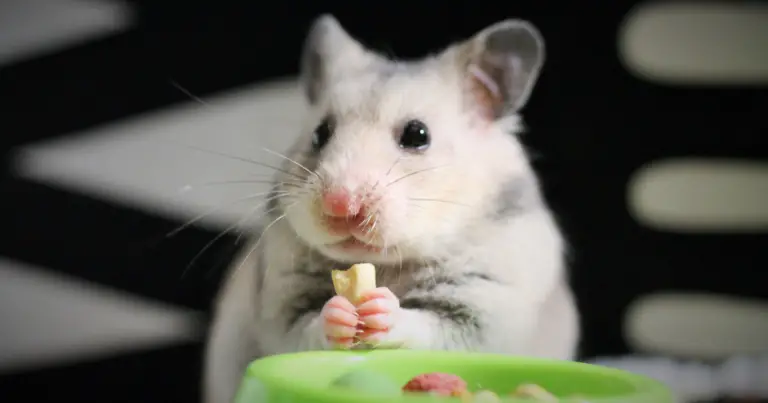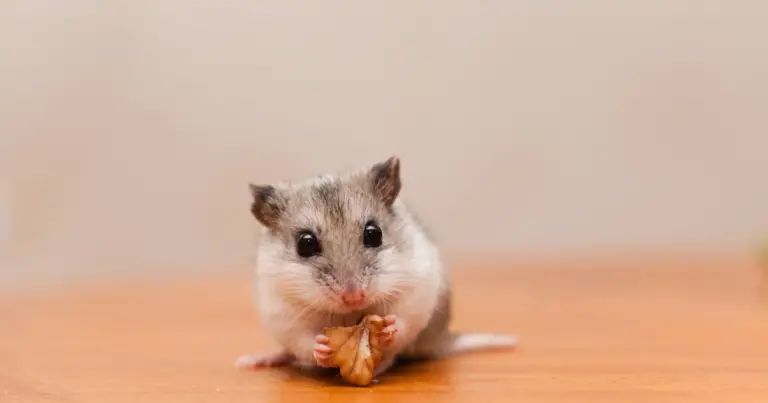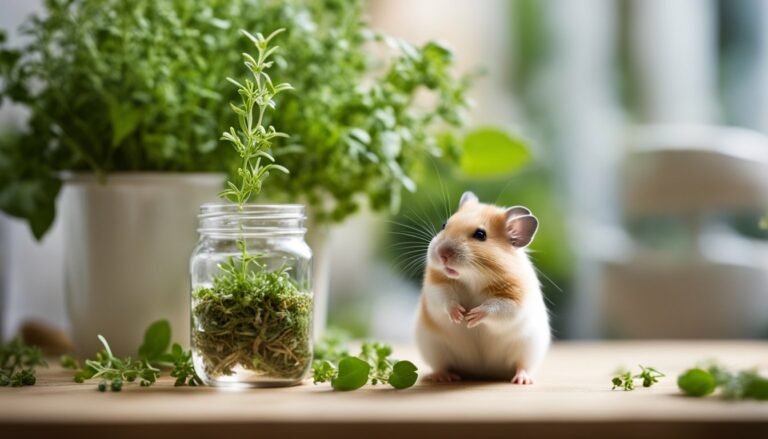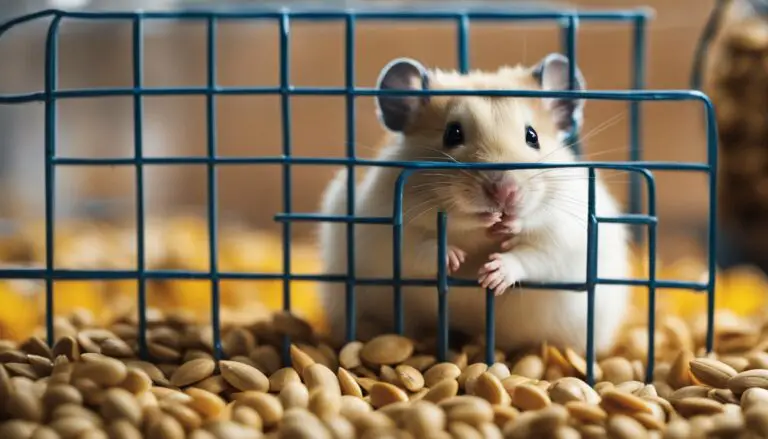What Can Hamsters Drink: A Quick Guide
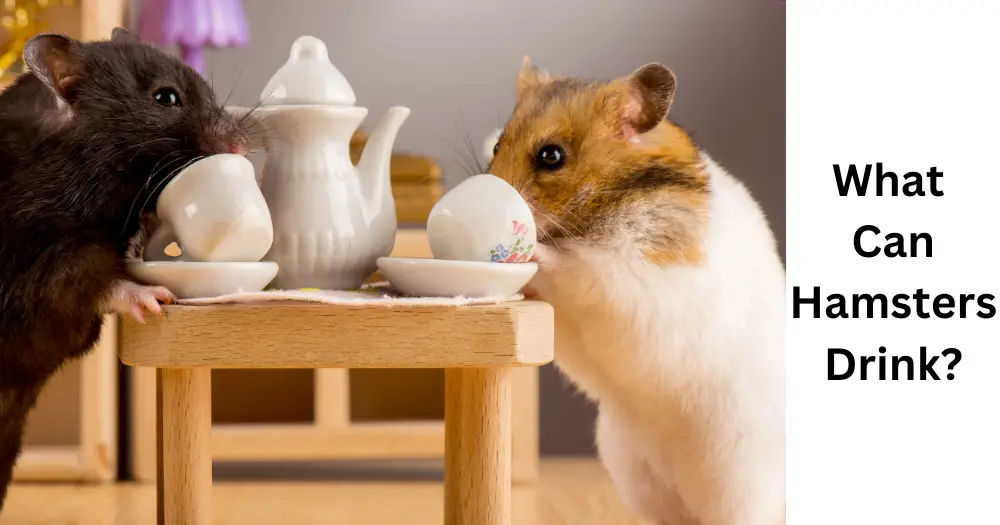
Keeping your hamster well-hydrated is essential for their health and well-being. Figuring out what can hamsters drink is crucial, as not all liquids suit these small pets. While water is the most common and safest option, understanding the variety of fluids a hamster can drink can help keep them happy and healthy.
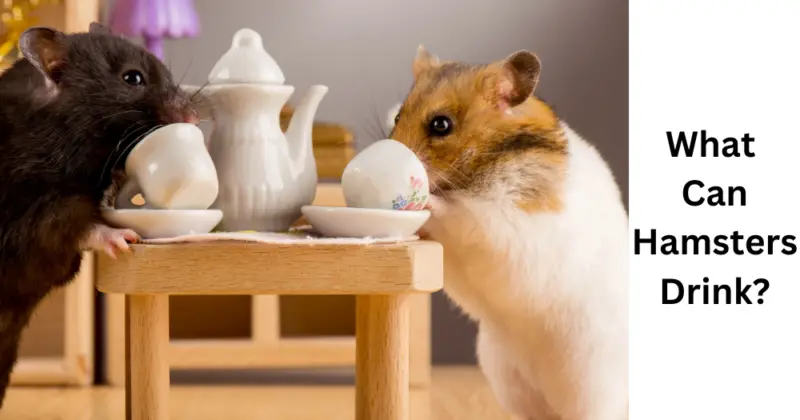
Hamsters require a proper hydration source to maintain their delicate digestive systems. When weaning hamsters, they should drink only water to ensure they get all the necessary vitamins and minerals. It’s important to remember that water should be their primary drink, while they can consume liquids from other sources, such as fruits and vegetables.
Monitoring your hamster’s water consumption is equally important, as deviations can signify potential health issues. On average, a hamster should drink 10 to 30 ml of water every day. Drinking more or less than this can indicate a problem and should warrant further investigation or a visit to the veterinarian.
Contents
Table of Contents
Essential Hydration for Hamsters
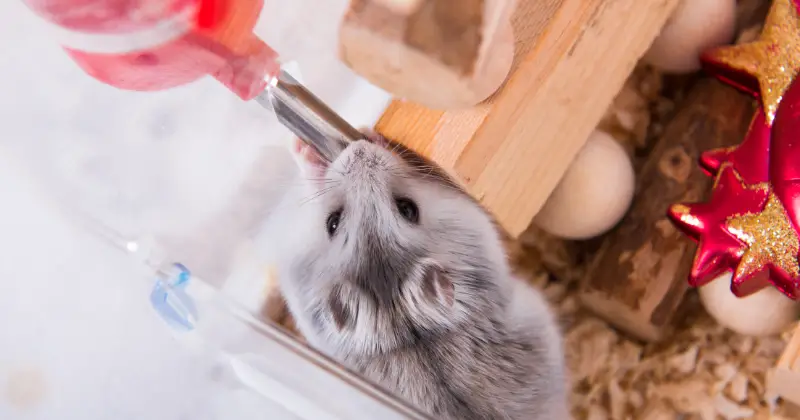
Water: The Ideal Drink for Hamsters
Hamsters must drink at least 10% of their body weight in water daily to stay healthy and hydrated. Water is the perfect drink for hamsters as it contains all the vitamins and minerals they need to survive and stay hydrated. Remember that this is just the minimum amount, and hamsters may need to drink more water, depending on their needs.
Water Bottle or Water Bowl
To provide fresh water to your hamster, you can use either a water bottle or a water bowl. Both options work well, but there are some considerations to keep in mind:
- Water bottles are often preferred because they help keep the water clean and free from any debris that might end up in a water bowl.
- Water bowls can be an alternative option, but they require more frequent cleaning, and there is a higher chance of contamination from bedding or other debris.
Tap Water or Bottled Water
Both tap water and bottled water can be provided to hamsters, as tap water is generally safe for hamsters. However, bottled water is typically preferred since it reduces the risk of contamination with potentially harmful substances commonly found in tap water. Always ensure that the water is fresh and changed regularly.
Filtered Water: Extra Protection
Filtered water can offer extra protection for your hamster by removing unwanted contaminants present in tap water. Filtered or bottled water is recommended for your hamster to help ensure they stay healthy and hydrated. Remember, clean water is essential for hamsters to avoid serious health issues such as kidney problems and even death.
Drinks to Avoid for Hamsters

Fruit Juices: More Harm Than Good
Although hamsters can consume small amounts of some fruits, fruit juices should be avoided. They are sensitive to the sugar and acidity in fruit juices, especially citrus fruits.
High concentrations of sugar can lead to health issues, such as obesity and diabetes, while the acid can cause diarrhea and discomfort. Stick to occasionally providing your hamster with water or very small portions of diluted low-sugar juices.
Tea and Coffee: Not Suitable for Pets
Caffeinated beverages like tea and coffee are not suitable for hamsters. The caffeine found in these drinks can cause increased heart rate, nervousness, and other health issues. Instead, provide your hamster with fresh, clean water to stay hydrated.
Milk and Non-Dairy Alternatives: Lactose Problems
While hamster pups drink their mother’s milk, cow’s milk and some non-dairy alternatives should be avoided for adult hamsters. Cow’s milk contains lactose, which can cause digestive issues such as diarrhea or bloating as hamsters are not equipped to break it down effectively.
Even though some non-dairy alternatives like almond, oat, and soy milk don’t have lactose, hamsters’ nutritional benefit is limited. It’s best to stick to water as their primary source of hydration.
Alcohol: A Dangerous No-No
Alcohol is extremely dangerous for hamsters, as even small amounts of ethanol can be toxic to them, potentially causing organ failure or death. Hamsters should never be given alcohol under any circumstance.
To summarize, hamsters should avoid fruit juices, caffeinated beverages, cow’s milk, and alcohol. Providing them with fresh, clean water is crucial to keep them healthy and hydrated.
Nutrition and Diet for Hamsters
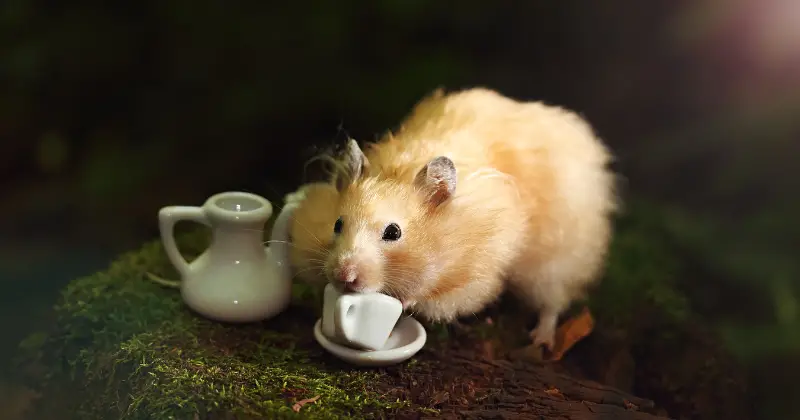
The Importance of a Balanced Diet
A balanced diet is essential for your hamster to stay healthy. Wild hamsters consume a mixture of seeds, cereals, insect larvae, and larger insects such as crickets for their nutrients.
As pets, hamsters need a balanced and varied diet containing all the essential nutrients and minerals. Key nutrients like vitamins, minerals, and fiber should be included in your hamster’s diet to ensure a healthy digestive system and overall well-being.
Fruits and Vegetables: Small Portions Matter
In addition to seeds and cereals, you can supplement your hamster’s diet with small amounts of fruits and vegetables. However, it is important to give your hamster these treats in moderation as high sugar content in fruits may lead to issues like obesity and diabetes if consumed in excess.
Some safe fruits and vegetables for your hamster include apples, carrots, peas, and cucumbers. Avoid offering grapes, raisins, or bananas, as they are high in sugar content.
When feeding fruits and vegetables, it is crucial to remember the appropriate portion sizes proportionate to their body weight. Keep the servings small, roughly the size of a raisin.
Pelleted Diets: The Staple Hamster Food
Pelleted diets are the staple food for most pet hamsters. These diets are specifically formulated to fulfill their nutritional needs and provide them with essential nutrients like calcium and antioxidants. A lack of complex carbohydrates has been implicated in increased diarrhea in hamsters, also known as “wet tail”.
Ensure that the pelleted diet you provide your hamster is of good quality and doesn’t contain too many additives or unnecessary calories. Non-lactating adult hamsters eat approximately 7 to 15 grams of food and drink 10 ml of water per 100 grams of body weight a day. Avoid overfeeding by weighing the food you give your pets with a gram scale.
Alongside food, make sure to provide your hamster with fresh, filtered water daily, as water is an essential part of their overall health and nutrition.
Pro Tip: Provide a variety of hamster toys and a spacious cage for your pet hamster to enjoy and stay active, as exercise is crucial to maintaining healthy body weight and preventing obesity.
Health Considerations for Hamsters
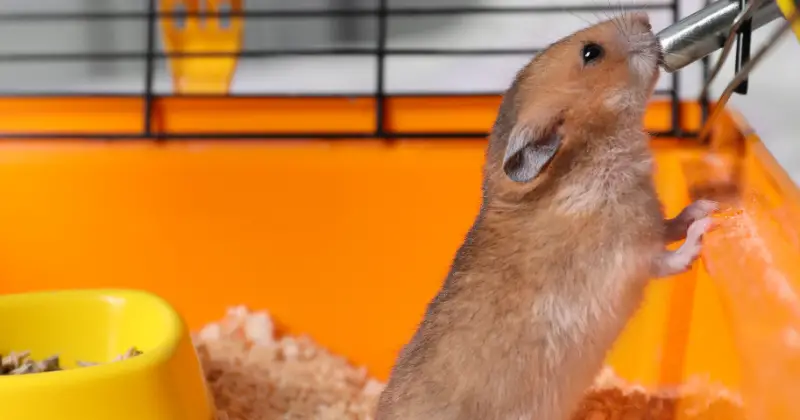
As a hamster owner, it is crucial to be aware of health considerations surrounding your pet’s diet, specifically concerning what hamsters can drink. This section will discuss some common health risks and symptoms associated with hamsters and the importance of regular vet checkups.
Common Health Risks and Symptoms
- Obesity and diabetes: Hamsters are prone to obesity and diabetes, which can be exacerbated by improper diet management. Monitor your pet’s food and water intake to avoid excessive high-sugar options like low-sugar juice consumption. Focus on providing a balanced diet with the right amount of protein and water.
- Teeth issues: Hamsters’ teeth grow continuously, so a healthy diet and proper exercise are essential for dental health.
- Wet tail: Caused by diarrhea or excessive drinking, wet tail is a common issue among hamsters. Monitoring their daily water intake and adjusting their diet accordingly can help prevent this condition from developing into something more severe.
- Contamination and poisoning: As with any pet, hamsters can suffer from contamination or poisoning if they ingest harmful substances. It is essential to ensure that contaminants such as alcohol or caffeinated beverages do not find their way into your pet’s diet.
Importance of Vet Checkups
Regular trips to the veterinarian are necessary to ensure your hamster’s overall health. Veterinary checkups can help identify any potential issues or complications that may arise from improper diet, exercise, or living conditions.
- Monitoring body weight
- Teeth examinations
- Urine and stool analysis
- Blood tests, in case of malnutrition or specific deficiencies
Taking your hamster for routine vet checkups will help you stay informed about their growth, health status, and any necessary adjustments to their diet, such as the optimal balance of water, potassium, and magnesium, as well as the prevention of harmful inflammation and cell damage.
By keeping up with these checkups, you’ll ensure that your hamster stays healthy, happy, and hydrated with appropriate beverages, such as plain water, skim or oat milk, and low-sugar juices when necessary.
Water bottles OR Bowls? | hamster care
Environmental Enrichment for Hamsters
Exercise and Toys for a Happy Hamster
Hamsters are active and playful pets that enjoy various toys and activities. Providing them with a range of hamster toys can help keep them entertained, mentally stimulated, and physically fit. A popular option for hamster exercise is a hamster ball, which allows your hamster to roam around and explore outside their cage for short periods of time.
Another fun option for your hamster is to include cardboard tubes from paper towel rolls or toilet paper rolls in their cage. They love to burrow and run through these tunnels, mimicking their natural behavior in the wild. Pay attention to your hamster’s preferences and switch up the toys regularly to keep them engaged and avoid boredom.
Clean and Safe Cage Setup
A proper cage setup is essential for your hamster’s overall well-being. Start by adding a layer of bedding that is 3-6 inches deep, depending on the size of your hamster. This will allow them to burrow and feel comfortable in their environment. Make sure to avoid using materials like cedar or pine shavings, as they can be harmful to your pet.
When it comes to hamster nutrition, providing them with a potable water source is crucial. To minimize spilling, consider using a water bottle with a sipper tube instead of a water dish. Additionally, ensure that your hamster has access to a proper diet, which should primarily consist of high-quality pellets supplemented by small amounts of fresh fruits and vegetables.
Remember to clean your hamster’s cage regularly, removing soiled bedding and wiping down surfaces. This will help maintain a hygienic environment for your pet and reduce the risk of health issues developing.
By following these guidelines, you can create a stimulating and safe environment for your hamster, ensuring they remain happy, healthy, and energetic throughout their life.
Conclusion: What Can Hamsters Drink

In conclusion, as pet owners, providing the right drinks for your hamsters is essential for their health and well-being. While healthy hamsters don’t require milk as part of their diet, they should always have access to water. The water supply must be clean and fresh.
Bottled water or water from a bowl are suitable options, but make sure to avoid giving them fizzy drinks, fruit juices, or alcohol. Remember that water is crucial for a hamster’s hydration, digestion, and overall health.
Offering water-rich foods and maintaining a balanced and natural diet on a daily basis will further support their hydration needs. You can keep your furry friend happy and healthy by prioritizing their water intake and making informed choices.
Q: Can I give my hamster milk as a drink?
A: No, giving hamsters milk as a regular drink is not recommended. While some animals, like cats and dogs, can tolerate milk, hamsters are lactose intolerant, and their digestive systems are not designed to process dairy products effectively.
Giving hamsters milk can lead to digestive issues, such as diarrhea and stomach upset. Instead, always provide your hamster with clean and fresh water to ensure proper hydration. Water is the best and safest drink for hamsters to maintain their health and well-being.

